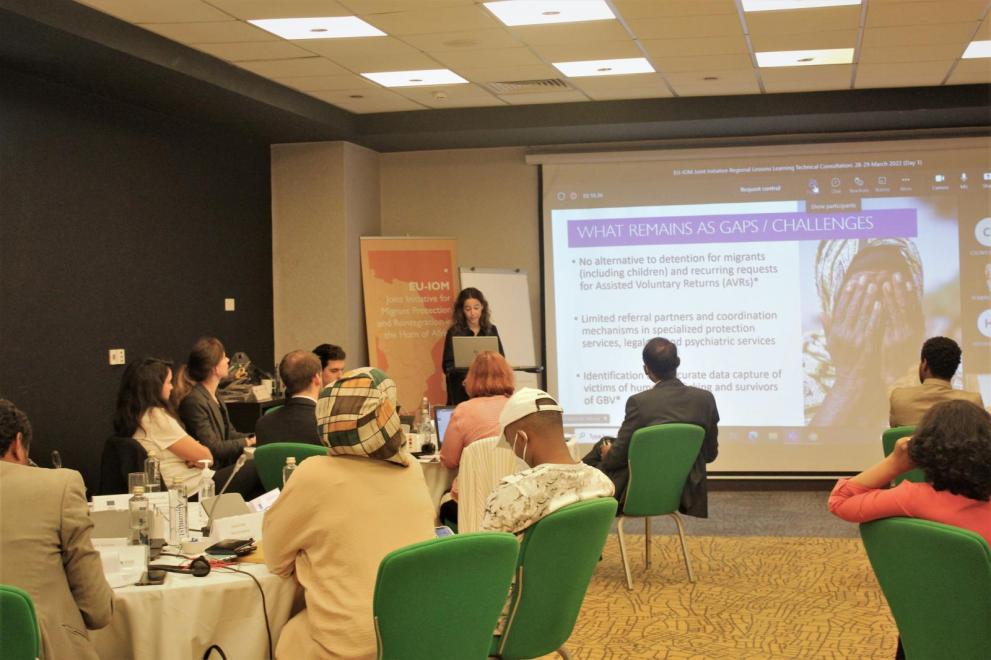
On 28-29 March 2022, the International Organization for Migration (IOM) organized a Participatory Regional Lessons Learning Consultation under the EU-IOM Joint Initiative for Migrant Protection and Reintegration in the Horn of Africa.
Five years into the programme, key stakeholders gathered to take stock of their cooperation, document learning and develop recommendations for future migrant protection and reintegration programming.
Attended by 58 (33 male, 25 female) participants representing the European Union (EU), EU Delegations, government counterparts, implementing partners, and IOM, the Consultation focused on direct assistance and return, reintegration at individual and community levels, as well as capacity building. Cross-cutting priorities such as sustainability, partnership, referrals, and local ownership, were also addressed. Discussions built on 13 country-level consultations held in Djibouti, Ethiopia, Somalia and Sudan between February and July 2021.
Interactive plenary and working group sessions enabled participants to share their views on the EU-IOM Joint Initiative’s achievements and formulate recommendations for continued engagement on shared migration governance and mobility priorities.
Key recommendations agreed include the need to systematically mainstream migration into national development plans, and enhance local ownership among national governments, local and regional authorities, host communities, migrants and returnees. This should include mobilizing communities and their resources from the start of development initiatives.
“A lessons learned exercise, especially at the regional level, is a massive and valuable process that has required significant efforts and the collaboration of all the project stakeholders over the last months,” said Thibault Van Damme, Programme Officer on Security and Migration in the European Commission’s Directorate-General for International Partnerships (DG INTPA).
“This has culminated, after two days of intense exchanges, in the identification of several best practices, lessons learned and recommendations that will be applied in our current programming exercise for a new Migrant Protection, Return and Reintegration Programme as the EU-IOM Joint Initiative for the Horn of Africa, under the EU Trust Fund for Africa (EUTF), will reach its end,” he added.
“Strong national referral systems and robust partnership with various stakeholders at all levels is crucial in mainstreaming migration, return and reintegration,” said Minyahil Negash, Acting Director for European Union Affairs at the Ministry of Foreign Affairs of the Government of Ethiopia. “Furthermore, it will ensure migration is included in national development plans. This helps maximize proper and effective utilization of resources. It also helps create more options and opportunities for returnees, potential migrants and other vulnerable populations.”
Mr. Negash applauded the EU-IOM Joint Initiative and stressed the importance of ensuring that future migrant protection, return and reintegration programmes build upon achievements of the Joint Initiative rather than reinventing the wheel.
About the EU-IOM Joint Initiative
Launched in December 2016, with funding from the EUTF, and contributions by the governments of Djibouti, Ethiopia, Somalia and Sudan, the EU-IOM Joint Initiative brings together 26 African countries of the Sahel and Lake Chad region, the Horn of Africa, and North Africa, along with the EU and the IOM, around the goal of ensuring that migration is safer, more informed and better governed for both migrants and their communities.
In the Horn of Africa, the EU-IOM Joint Initiative has so far assisted close to 8,300 migrants to return to their countries of origin. Nearly 13,000 have been supported with reintegration assistance to restart their lives. Communities have also benefited from 55 community-based reintegration projects, ranging from green initiatives to infrastructure support, social cohesion activities, mental health and psychosocial support services, and beyond. All projects are driven by communities themselves, which helps fosters cohesion between host communities, returnees, local authorities and other key stakeholders.
Details
- Publication date
- 19 April 2022
